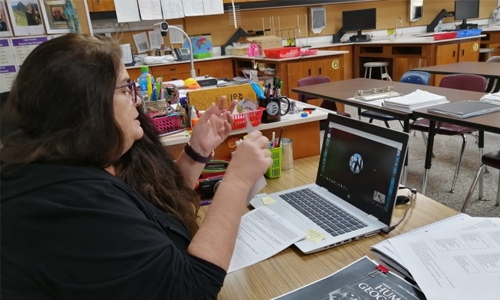Bahrain teachers proud to sustain quality education
TDT | Manama
The new 2020-2021 ac- ademic year and virtual lessons in the Kingdom of Bahrain have already begun yesterday and they are being adopted alongside in-person classes starting on October 25. On the day of their return to schools following the summer holiday, teachers said that sustaining quality education during the coronavirus (COVID-19) pandemic is a national duty that they are proud to perform as part of Team Bahrain.
They stressed that students’ right to education would be secured as the learning process – particularly the transition to online teaching and learning – is fully supported by His Majesty King Hamad bin Isa Al Khalifa and implemented by competent staff. In coordination with administrative and technical staff of various schools, the Education Ministry has also assured the public that great efforts and preparations were made throughout the summer vacation to be able to implement comprehensive virtual or in-person classes. More importantly, Education Minister Dr Majid bin Ali Al Nuaim emphasised, all precautionary measures and health guidelines are taken to ensure the safety of students and school personnel against the COVID-19 during in-person classes.
The Ministry will be providing public schools lessons initially online through various platforms, such as email and instant messaging, as well as via television programmes. In particular, the central and visual lessons will be broadcast on Bahrain TV, in co-operation with the Ministry of Information. A total of 14 YouTube channels and other social networks will be used to secure the best methods for students to learn. Several private schools, meanwhile, have opted for blended education, mixing in-person attendance with online education.
Key role
In light of the pandemic, online learning truly plays a key role to ensure continuous provision of quality education for the students, especially with the availability of modern technologies and the tremendous efforts exerted by the Ministry of Education to ensure the success of so-called distance learning. In the Kingdom, and in many countries, online teaching is now recognised as a formal method, in parallel with teaching in schools, following months of experimenting with the method as a result of the global health crisis.
In fact, distance learning has been implemented for a long time, but this is the first time that the Education Ministry has implemented the programme methodically, widely and with many positive signs. So from now on, online teaching will be considered a form of formal teaching. The combination of online teaching and direct learning must continue to be implemented, according to the Ministry.
Issues
However, being a new method, many believe the shift to online education during this period of disruption is facing a variety of issues due to poor internet infrastructure and transmission servers; as well as limited interaction between teachers and students, especially in preschool and primary school.
Speaking about the school-hosted online teaching, Assistant Undersecretary for General and Technical Education Latifa Al Bunoudha said the Ministry has completed preparations for the online learning, pointing out that all schools have communicated with parents, sent the timetables for their chil- dren, clarified the methods used in studying and provided other instructions and guidelines.
Al Bunoudha explained that education during the first two weeks will focus on imple- menting virtual classes using the Teams programme and the ministry’s educational portal, adding that sessions in the time- tables were distributed basically on both means. She also noted that all links and instructions that help students activate their accounts in the virtual classes and the educational portal were sent to them, in addition to explaining how to obtain digital technical support.
Solutions
The solutions?
Schools should improve ad- vanced technology skills and pedagogy methods of online teaching for teachers. Students must also be guided by teachers – and even by parents or guardians – to improve their self-awareness and respon- sibility, especially knowledge and skills, when participating in the online environment. Software is as important as hardware, meaning teachers and students will need to have the necessary computers or tablets which can run the required software for online classes, as well as a decent network infrastructure. Without these, they are at risk of classes being disrupted by network errors or poor access to learning resources.
Stuck at home
Just for the record, accord- ing to Unesco, over one and a half billion school or college-age learners are now stuck at home, representing roughly 90% of the world’s student population, triggered by the coronavirus crisis at one point in March 2020. As schools look ahead to the new academic year and beyond, it’s clear that embracing a flexible blend of virtual and in-person classes will be the key to sustaining quality education.
Related Posts

